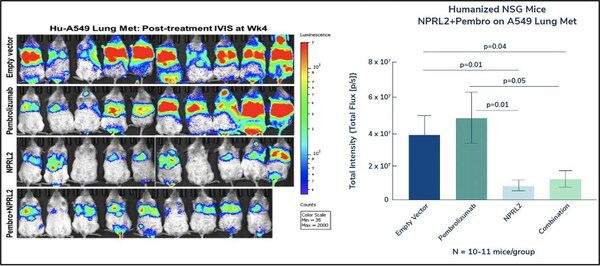Source: Genprex, Inc. 4/2/2024
NPRL2 Gene Therapy Induces Anti-Tumor Activity in Anti-PD1 Resistant KRAS/STK11 Mutant Non-Small Cell Lung Cancer in a Humanized Mouse Model
Provides Additional Preclinical Validation of Oncoprex® Delivery System With Another Tumor Suppressor Gene
Genprex, Inc. ("Genprex" or the "Company") (NASDAQ: GNPX), a clinical-stage gene therapy company focused on developing life-changing therapies for patients with cancer and diabetes, today announced that its research collaborators have published positive preclinical data for the NPRL2 tumor suppressor gene, utilizing the Company's non-viral Oncoprex® Delivery System, in KRAS/STK11 mutant anti-PD1 resistant non-small cell lung cancer (NSCLC) in a humanized mouse model.
NPRL2 is a tumor suppressor gene whose expression is reduced in many cancers including lung, renal, colorectal, glioma, gastric, and hepatocellular carcinoma, and it has been closely correlated with poor clinical outcomes.
Genprex's Oncoprex® Delivery System is a novel non-viral approach that utilizes lipid-based nanoparticles in a lipoplex form to deliver tumor suppressor genes deleted during the course of cancer development. The platform allows for the intravenous delivery of various tumor suppressor genes, and potentially other genes, to achieve a therapeutic affect without the risk of toxicity often associated with viral delivery systems. Genprex believes this system allows for delivery of a number of cancer-fighting genes, alone or in combination with other cancer therapies, to combat multiple types of cancer.
The manuscript, titled, "NPRL2 gene therapy induces effective anti-tumor immunity in KRAS/STK11 mutant anti-PD1 resistant metastatic non-small cell lung cancer (NSCLC) in a humanized mouse model," was published on the bioRxiv biology preprint server.
"These positive preclinical data are very encouraging and support NPRL2 gene therapy as a potential treatment for a sub-group of NSCLC in which patients traditionally are resistant to existing therapies," said Rodney Varner, President, Chairman and Chief Executive Officer at Genprex. "We believe this data could support the potential for a new drug candidate in our pipeline, and it also provides further evidence that the Oncoprex® Delivery System has the ability to be successful using genes other than the TUSC2 gene we are already using in clinical trials with Reqorsa®."
The studies evaluated the intravenous injection of NPRL2 gene-loaded cationic lipoplexes (DOTAP-NPRL2) with or without anti-PD1 drugs (pembrolizumab). The studies used a KRAS/STK11 mutant anti-PD1 insensitive cell line, as well as syngeneic mouse LLC2 tumors, which are also anti-PD1 resistant. In both of these mouse models, NPRL2 showed a significantly strong anti-tumor effect whereas anti-PD1 (pembrolizumab) was not effective. The anti-tumor effect was greater in humanized mice than non-humanized mice, suggesting that an immune response contributed to anti-tumor activity.
Additionally, a dramatic anti-tumor effect was mediated by NPRL2 treatment with or without a pembrolizumab combination. Bioluminescence imaging on mice showed that 7 out of 10 mice contained an extremely low amount of tumor burden in the NPRL2 treatment group, which was significantly different than in the control or pembrolizumab group.
Unlike previous experiments with Reqorsa® Immunogene Therapy (quartusugene ozeplasmid), the Company's lead drug candidate using the TUSC2 tumor suppressor gene, the anti-tumor efficacy of DOTAP-NPRL2 did not involve Natural Killer (NK) cells. The studies also found that tumors with stable NPRL2 expression exhibited significantly slower growth compared to controls. In conclusion, researchers reported that NPRL2 gene therapy induces anti-tumor activity through dendritic cell-mediated antigen presentation and cytotoxic immune cell activation.
About Genprex, Inc.
Genprex,
Inc. is a clinical-stage gene therapy company focused on developing
life-changing therapies for patients with cancer and diabetes. Genprex's
technologies are designed to administer disease-fighting genes to
provide new therapies for large patient populations with cancer and
diabetes who currently have limited treatment options. Genprex works
with world-class institutions and collaborators to develop drug
candidates to further its pipeline of gene therapies in order to provide
novel treatment approaches. Genprex's oncology program utilizes its
systemic, non-viral Oncoprex® Delivery System which encapsulates the
gene-expressing plasmids using lipid-based nanoparticles in a lipoplex
form. The resultant product is administered intravenously, where it is
taken up by tumor cells that then express tumor suppressor proteins that
were deficient in the tumor. The Company's lead product candidate,
Reqorsa® Immunogene Therapy (quaratusugene ozeplasmid), is being
evaluated in three clinical trials as a treatment for NSCLC and SCLC.
Each of Genprex's three lung cancer clinical programs has received a
Fast Track Designation from the FDA for the treatment of that patient
population, and Genprex's SCLC program has received an FDA Orphan Drug
Designation. Genprex's diabetes gene therapy approach is comprised of a
novel infusion process that uses an AAV vector to deliver Pdx1 and MafA
genes directly to the pancreas. In models of Type 1 diabetes, GPX-002
transforms alpha cells in the pancreas into functional beta-like cells,
which can produce insulin but may be distinct enough from beta cells to
evade the body's immune system. In a similar approach, GPX-002 for Type 2
diabetes, where autoimmunity is not at play, is believed to rejuvenate
and replenish exhausted beta cells.


No comments:
Post a Comment